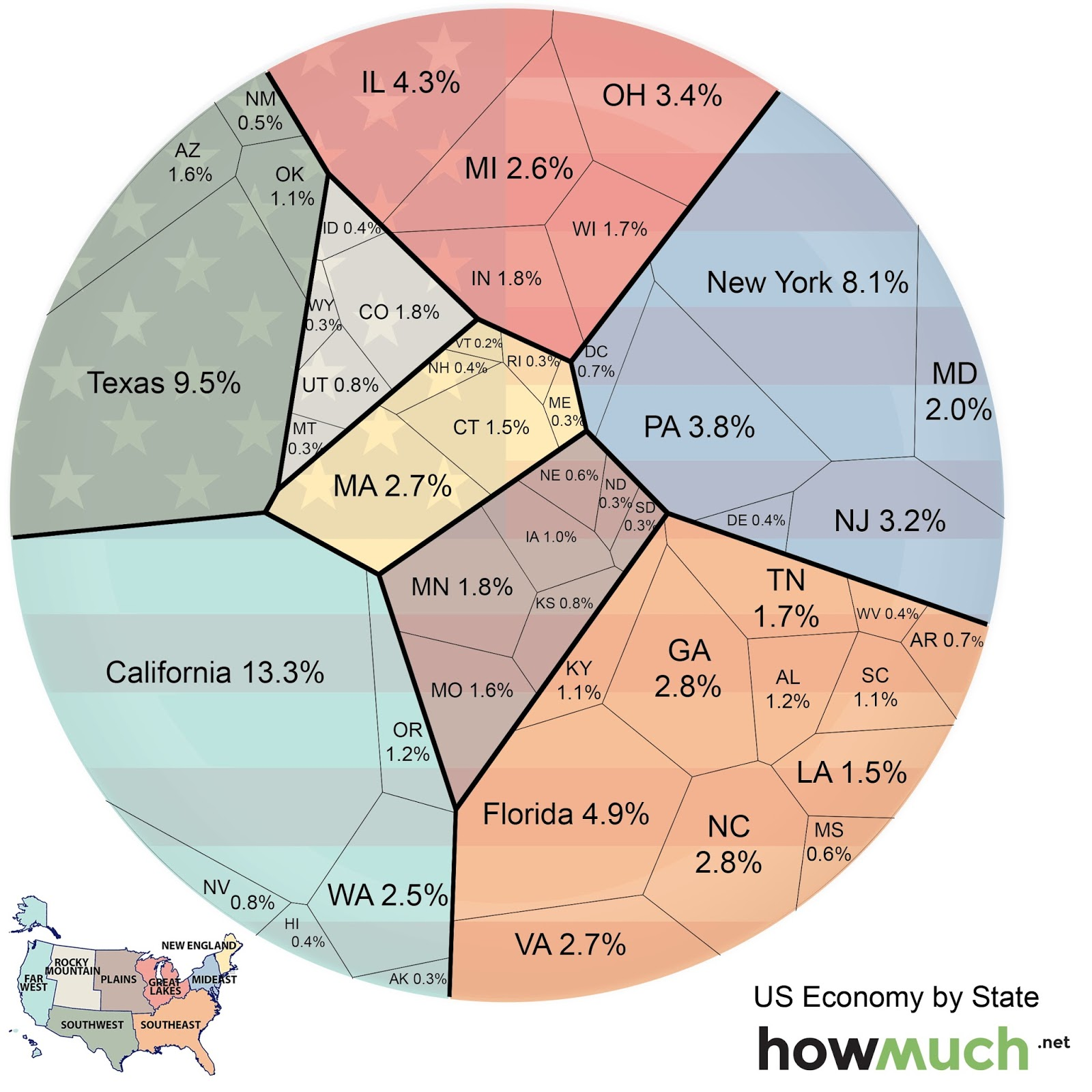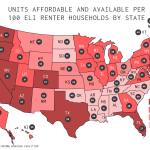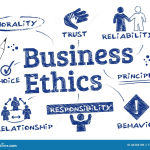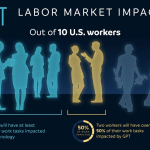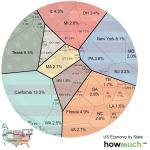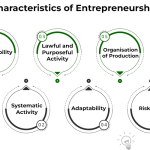The U.S. economy is navigating a challenging landscape marked by uncertainty, fluctuating consumer sentiment, and looming recession risks. Recent trade wars with major partners like China, Mexico, and Canada have raised alarms among investors, with many fearing that such tensions could push the country into a recession. As the Federal Reserve debates whether to adjust interest rates, the delicate balance between supporting economic growth and controlling inflation is becoming increasingly apparent. Additionally, fiscal crises resulting from governmental mismanagement are contributing to the falls seen in the stock market, further complicating the economic outlook. This convergence of factors underscores the fragile state of the U.S. economy today, prompting both analysts and policymakers to ponder the road ahead.
The economic landscape of the United States is undergoing significant turbulence, characterized by various shifts that pose serious questions for its future. Amid ongoing conflicts in international trade, consumers are expressing a marked decline in confidence, suggesting apprehensions about the economy’s stability. The interplay between governmental fiscal policies and interest rates presents a complex dilemma for the Federal Reserve, as officials must navigate potential repercussions of a forthcoming recession. The risk of financial downturns looms large, further exacerbating fears surrounding the market’s volatility. As the nation confronts these multifaceted challenges, stakeholders across the board are left to speculate on the implications for growth and economic resilience.
The Challenges of the U.S. Economy Amid Trade Wars
The U.S. economy is currently facing a multitude of challenges largely exacerbated by the ongoing trade war with major partners like China, Mexico, and Canada. The imposition of tariffs has not only affected international trade relations but has also sparked fears of economic slowdown among investors. With the U.S. stock market experiencing significant losses, growing apprehensions about the potential for recession are evident. Analysts suggest that prolonged exposure to high tariffs could lead to decreased consumer spending and investment, crucial components of economic growth.
Furthermore, the uncertainty brought on by the trade war influences consumer sentiment significantly. Recent data from the University of Michigan indicates a notable decline in the consumer sentiment index, revealing that American households are becoming increasingly anxious about both personal finances and the overall economic outlook. This trepidation could lead to reduced consumer spending, further compounding the economic challenges faced by the U.S. economy.
Rising Recession Risks and Their Economic Implications
As the trade war intensifies, recession risks are becoming an ever-looming threat to the U.S. economy. Economists now warn that a recession could be more likely within the next year than it was previously thought. Factors contributing to this increased risk include a volatile stock market, a decrease in consumer spending due to lowered confidence, and potential cuts to government spending. Each of these elements plays a critical role in the overall economic stability and can create a feedback loop negatively impacting growth and employment.
Moreover, the predictions of recession are exacerbated by the Federal Reserve’s precarious position regarding interest rates. On one hand, the Fed may need to lower rates to stimulate growth; on the other hand, controlling inflation remains a pressing concern. This dilemma places the U.S. economy in a precarious balancing act, where the risk of recession may be fueled by external shocks such as changes in interest rates and fiscal policies.
Consumer Sentiment: A Window into Economic Health
Consumer sentiment serves as a vital indicator of the economic health of a nation, reflecting the confidence that consumers feel towards the economic environment. The recent downturn in the University of Michigan’s consumer sentiment index marks a significant concern for the U.S. economy, suggesting that households are apprehensive about both present and future economic conditions due to rising costs and uncertainty from tariff policies. As consumer confidence wanes, there’s a likelihood that spending habits will shift towards caution, potentially leading to a slowdown in economic activity.
Additionally, lowered consumer sentiment may have far-reaching implications beyond immediate purchasing behaviors. When consumers are less optimistic about the economy, this can translate into reduced business investments and hiring as companies react to a more restrained spending environment. In turn, this could lead to broader economic repercussions, including rising unemployment rates and diminished economic growth, exacerbating recession fears that are already prevalent.
Interest Rates: The Fed’s Dilemma in a Turbulent Economy
The Federal Reserve is currently grappling with the delicate balance of managing interest rates in a turbulent economic climate marked by trade wars and heightened uncertainty. On one hand, cutting interest rates could provide much-needed relief to consumers and businesses, stimulating spending and investment. However, high inflation rates present a formidable barrier, forcing the Fed to consider the risk of worsening inflationary pressures if rates are too low. This tradeoff complicates the Fed’s decision-making process and illustrates the broader implications of economic policy on the U.S. economy.
Furthermore, the implications of maintaining or adjusting interest rates could resonate beyond the immediate economic landscape. If the Fed opts to cut rates, it must be cautious of the potential for creating an environment ripe for speculation and excessive borrowing, which can exacerbate the fiscal crisis. Conversely, maintaining higher rates could stifle growth and lead to prolonged economic stagnation. This juggling act highlights the crucial role that monetary policy plays in navigating the complexities of the current U.S. economic environment.
Trade War Impact: Long-Term Consequences for the U.S. Economy
The implications of the ongoing trade war extend far beyond immediate market reactions, potentially laying the groundwork for long-term challenges for the U.S. economy. Trade policies imposed by the current administration have not only raised costs for consumers but have also created an environment of uncertainty that can hinder investment. Companies are now faced with tough decisions on whether to expand operations or scale back, given the unpredictability surrounding international tariffs and their implications on supply chains.
Moreover, the long-term repercussions of the trade war include the risk of a fiscal crisis should unresolved disputes lead to sustained negative impacts on key industries. Without effective resolution and strategic planning, the U.S. could face a decline in global competitiveness, high unemployment rates, and increased volatility in stock markets. These factors will play a significant role in shaping the broader economic narrative and could result in a re-evaluation of U.S. trade policy moving forward.
The Interplay of Fiscal Policy and Economic Stability
Fiscal policy is a significant player in influencing the overall health of the U.S. economy, especially in light of current government spending habits and proposed cuts. As part of the government’s strategy to balance budgets amid rising debt, significant cuts could inadvertently lead to increased unemployment and reduced public services, compounding the challenges posed by the ongoing trade war. This could trigger a chain reaction that results in diminished consumer spending and a slowdown in economic growth, highlighting the importance of strategic fiscal management.
Additionally, the interplay between fiscal policy and consumer confidence cannot be overstated. As government decisions impact the livelihood of everyday citizens, negative perceptions regarding fiscal policy can further damage consumer sentiment. Heightened concerns over potential government shutdowns or failure to raise the debt ceiling could prompt households to adopt a more cautious approach to spending, further exacerbating recession risks and leading to an economic downturn.
The Role of Government Decisions in Shaping Economic Outcomes
Government decisions regarding tariffs and spending have profound effects on the U.S. economy and its stability. The recent approach towards trade has raised concerns among international partners and domestic stakeholders, leading to increased volatility in financial markets. Such unpredictability undermines confidence among businesses and consumers alike, resulting in a wait-and-see attitude that can hamper economic growth. In this context, proactive and strategic decision-making is essential to restore trust and foster a positive economic environment.
Moreover, the potential panic within the markets stemming from erratic government policies can lead to a vicious cycle of negative outcomes. As businesses hold back on investments and hiring due to uncertainty, employment opportunities dwindle, further dragging down consumer sentiment. This downward spiral reflects the necessity for coherent and consistent government policies that prioritize economic stability and mitigate recession risks.
Exploring Stagflation: A Concern for Future Economic Conditions
The specter of stagflation—characterized by stagnant growth, high unemployment, and high inflation—raises significant concerns for the current U.S. economy. As various economic indicators hint at a potential slowdown, the risks of experiencing an economic landscape reminiscent of the 1970s are worth considering. Factors such as sustained trade wars and erratic fiscal policies could create conditions ripe for stagflation, pressuring households and businesses alike.
Addressing stagflation requires a multifaceted approach, examining both monetary strategies and fiscal policies. While the Federal Reserve might be compelled to intervene by adjusting interest rates, global considerations and domestic pressures complicate their ability to act effectively. If left unaddressed, the possibility of stagflation could not only erode consumer confidence but could also deter investment, ultimately challenging the future trajectory of the U.S. economy.
Navigating Economic Uncertainty through Strategic Measures
Navigating the current economic uncertainty necessitates a comprehensive response from government institutions, businesses, and individuals alike. Acknowledging the threats posed by trade wars, high inflation, and recession risks is essential for developing effective strategies. Policymakers must prioritize transparency and clear communication to alleviate investor concerns while fostering an environment conducive to growth. The functionality of economic policy hinges on the collaboration of all stakeholders to address pressing issues collectively.
Individuals and businesses must also adapt to the evolving landscape, utilizing strategic planning to mitigate the potential financial fallout from ongoing uncertainties. This adaptation might involve diversifying investments, focusing on consumer needs, and maintaining flexibility in spending practices. By taking proactive measures, stakeholders can better prepare for the unpredictabilities of the economy, ensuring resilience amidst challenges.
Frequently Asked Questions
What is the impact of the trade war on the U.S. economy?
The ongoing trade war has significantly affected the U.S. economy, leading to market volatility and fears of a recession. Tariffs imposed by other countries in retaliation for U.S. import taxes have created uncertainty, reducing consumer confidence and potentially slowing economic growth. Investors are concerned that prolonged trade disputes could result in reduced spending and investment, ultimately risking a recession.
How do recession risks influence the U.S. economy?
Recession risks play a crucial role in shaping the U.S. economy as they directly affect consumer sentiment and business investment decisions. Increased fears of a recession can lead to reduced consumer spending, which is a major component of economic growth. Additionally, if businesses anticipate a downturn, they may cut back on hiring and investment, further exacerbating economic challenges.
What role do interest rates play in stabilizing the U.S. economy?
Interest rates are a key tool for the Federal Reserve in managing economic stability. Lowering interest rates can stimulate borrowing and spending, potentially bolstering the U.S. economy in times of recession risks. However, maintaining higher rates can help control inflation. The Federal Reserve often faces challenges in finding the right balance between these two objectives to support sustained economic growth.
How does consumer sentiment reflect the health of the U.S. economy?
Consumer sentiment is a vital indicator of the U.S. economy’s health, reflecting how confident consumers feel about their financial situations and the broader economic outlook. A decline in consumer sentiment, as noted in recent reports, can signal potential decreases in spending and investment, which can trigger further economic slowdowns or even a recession.
What implications does a fiscal crisis have for the U.S. economy?
A fiscal crisis can have severe consequences for the U.S. economy, including potential government shutdowns, lowered public spending, and reduced consumer confidence. Such crises may arise from failure to raise the debt ceiling or budgeting issues, resulting in increased uncertainty, higher borrowing costs, and ultimately, risks of economic stagnation or recession.
| Key Point | Details |
|---|---|
| Current Economic Condition | U.S. markets face heavy losses due to tariffs imposed by China, Mexico, and Canada as a response to U.S. tariffs. |
| Consumer Sentiment | The University of Michigan’s consumer sentiment index is at its lowest since November 2022. |
| Risk of Recession | The likelihood of a recession is higher than the previous year, influenced by the trade war, stock market downturn, and fiscal crises. |
| Impact of Tariffs | Most economists oppose tariffs; they argue they hurt investments rather than support manufacturing and long-term growth. |
| Federal Reserve’s Dilemma | The Federal Reserve considers whether to cut interest rates to support jobs or maintain them to control inflation. |
Summary
The U.S. Economy is currently facing significant scrutiny as uncertainties surrounding tariffs and market stability threaten to lead the nation into a recession. Key indicators such as consumer sentiment have declined sharply, and various economic risks have escalated, thereby exacerbating the fears of an impending downturn. As discussions around monetary policy intensify, the Federal Reserve’s challenge remains to navigate between stimulating growth and containing inflation, making the outlook for the U.S. economy increasingly precarious.
